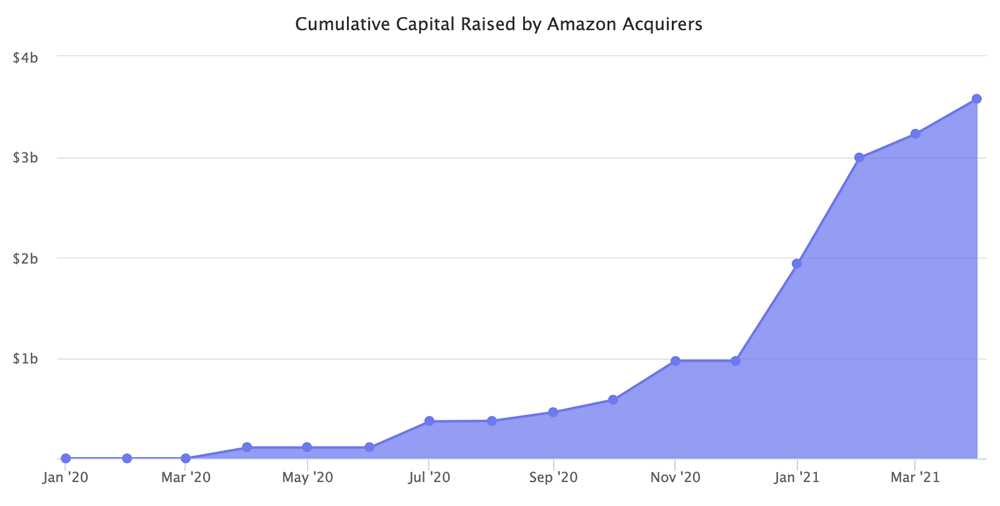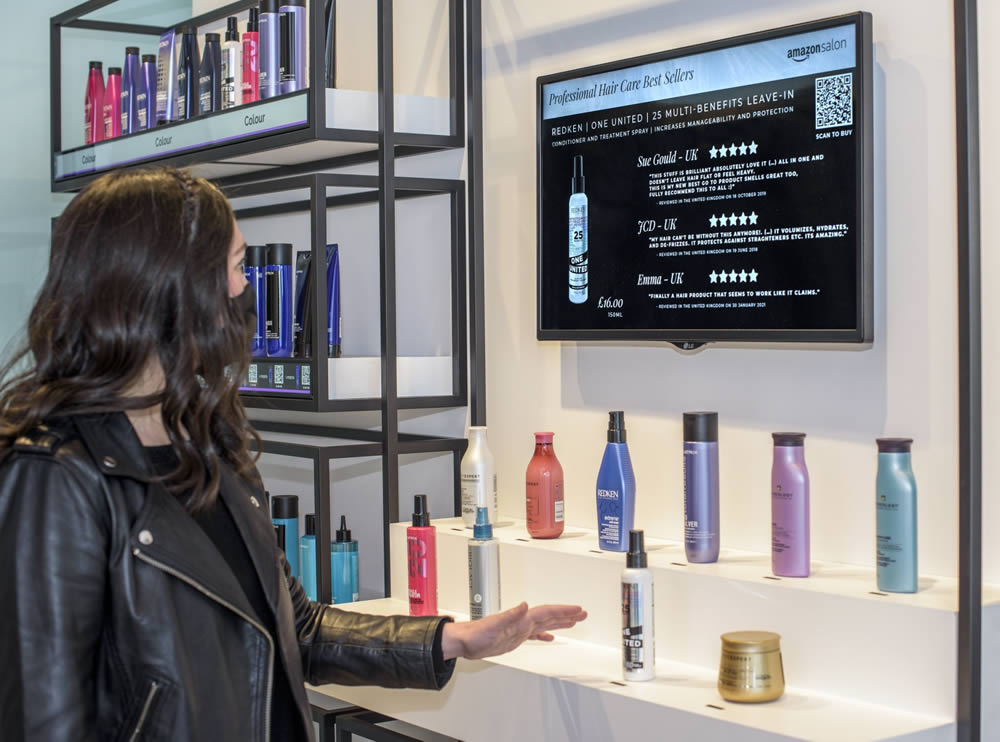The Web Retailer News Digest for April 23rd, 2021
New research into companies that buy up Amazon FBA brands has found that they raised an astonishing $3.5 billion in the last 12 months.
The analysis by Marketplace Pulse found that two-thirds of this capital was raised in just the first four months of the year. If this pace continues, the total for 2021 will reach $7.5 billion. All for buying up Amazon sellers.
Perhaps the most telling statistic is that one company accounted for almost 50% of the total capital raised. This company, Thrasio, is by far the largest of the dozens of acquisition companies that now exist globally.
What does all this money flowing into “brand aggregators” mean for Amazon sellers? Is it a sign that the future is bright for small sellers, or that their Amazon heyday is coming to an end?
Cash is pouring in
On the one hand, such large amounts of money being raised is a vote of confidence in the whole idea of building brands for the Amazon marketplace. Until very recently, a business that relies on Amazon for all its sales would be seen as a very risky proposition – suitable for little more than a side-hustle or hobby.
But now these acquisition companies, and the large banks and investors that support them, are falling over themselves to get a piece of the action. With so much competition to buy up the best brands, is the opportunity to sell your own business greater than ever before? Play your cards right, and you could have multiple acquirers bidding to buy you out.

But what does it mean for the future? As the aggregators absorb more and more of the market, will the whole landscape change? Instead of many small, independent businesses, in a few years the Amazon marketplace might be ruled by just a few brand conglomerates.
We already know that these companies have the money behind them, and they often bring to the table years of product development, procurement, ecommerce and marketing experience. Any knowledge that they don’t already have will be hired in, and their ability to leverage specialist skills from across large teams will be far beyond those of your average Amazon seller.
So, the aggregators of today will become the conglomerates of the future. They are using truckloads of cash to buy and grow brands. Brands that have great potential, with the hard work already done by creative but exhausted entrepreneurs.
These acquisition companies have the money and skills to grow brands quickly and dominate the market. And ample resources to stomp on any upstarts that dare to challenge them.
Read more at Marketplace Pulse.
Amazon news
Europe gears up for a bumper Prime Day
Following last week’s speculation that Prime Day could be coming in June, more clues are coming in from Amazon in Europe.
Firstly, the window for Prime Day Lightning Deals submissions is already closing, with the deadline set for Friday, April 23. UK and European sellers need to get their deals in urgently.
Secondly, Amazon is waiving FBA removal fees for fulfillment centers across Europe until Tuesday, April 27. Removals from Amazon’s fulfillment centers can often be expensive – after all, Amazon has to spend time picking, packing and shipping the stock just as they do for customer orders. It costs them money, and they pass that cost on to the sellers.
So this amnesty on removal fees shows that Amazon is strongly motivated to clear out old stock and make way for new inventory. It’s worth more to them to forego the usual fees and make space for the Prime Day sales rush instead.
Read more at Amazon Seller Forums for Prime Day submission window and free removals
Other online marketplaces
eBay makes research tool free for all sellers
eBay has removed the requirement for a Store subscription to access its Terapeak Product Research tool.
Terapeak provides insights into the eBay marketplace, covering which products are selling the best and for how much. It helps sellers decide what to sell and optimize their listings.
Product Research will be free for all sellers while a new tool called Terapeak Sourcing Insights will remain exclusive to eBay store subscribers. Sourcing Insights will provide additional features such as identifying categories with high demand and low supply, and showing trends over time.
eBay acquired Toronto-based company Terapeak in 2017, fifteen years after it was founded by brothers Andrew and Anthony Sukow.
Read more at eBay Community.
Etsy hits 10 million sellers
Etsy added twice as many sellers to its platform in 2020 as in 2019.
After starting 2020 with seven million sellers, Etsy has now broken the ten million sellers milestone, according to research by Marketplace Pulse. Not only that, the pace of sign-ups is accelerating with 300,000 more being added each month.
As is typical for new sellers joining all marketplaces, many of the new Etsy sellers never become active or make a single sale. However, the number of sellers with products listed for sale has doubled in the last year and Etsy now has 100 million listings on the site.
Sales on Etsy have grown enormously during the pandemic, led by homemade facemasks. These have become so popular on the site that Etsy added four new categories just for facemask accessories.
Read more at Marketplace Pulse.
Alibaba takes action after $2.8 billion fine
Earlier this month, Alibaba was hit with a record fine by Chinese regulators for abusing its market position, mainly by restricting sellers from trading or running promotions on rival marketplaces.
Alibaba has now also unveiled measures which reduce costs and lower entry barriers to merchants on Tmall and Taobao. The new measures include:
- No deposit fees for new merchants on Taobao. Existing sellers will have their deposits refunded.
- Waiving of fees for a range of marketing tools and services on both Tmall and Taobao.
- Allowing Taobao merchants to visit operation centers for support, and opening new operation centers across the country.
The wheels of justice in China seem to run faster, and with much greater secrecy, than in the Western world. Regulators in the US and Europe continue to investigate Amazon and other US tech giants, in cases which have a high media profile but little in the way of concrete actions.
Read more at Alizila.
Webinars in the week ahead
For everyone
April 27: Insider Tips from ex-Amazonians (Tinuiti).
April 28: eBay Q1 2021 financial results call (eBay).
April 29: Amazon Q1 2021 financial results call (Amazon).
Various dates: Amazon advertising’s global webinar program rolls on with 20+ webinars scheduled, covering Sponsored Products, Sponsored Brands, reporting, optimization and tips (Amazon).
For US sellers
April 26: Amazon IP accelerator (Amazon).
April 29: eBay monthly seller check-in (eBay).
For UK sellers
April 27: How to identify your best market for overseas expansion (Retail Without Borders).
April 29: Improving customer delivery and returns experiences (Tamebay – registration closed).
And finally…
Amazon wants to cut your hair
Amazon is opening its first ever hair salon. The new salon called, um, Amazon Salon, will occupy 1,500 sq. ft. of space over two floors. It will initially only cater to Amazon staff, and then open to the general public.
Explaining the opening, Amazon UK country manager said:
We have designed this salon for customers to come and experience some of the best technology, hair care products and stylists in the industry. We want this unique venue to bring us one step closer to customers, and it will be a place where we can collaborate with the industry and test new technologies.
Customers will be able to see themselves with different hair colors using augmented reality technology on Amazon Fire tablets (of course).
The salon will also test new “point-and-learn” technology, where customers only have to point at a product on a shelf and they will then be shown reviews, videos and “educational content” on a display screen. Just to clarify, it will be educational content about hair products, not actually content that is educational.

Overall, it will be like shopping on Amazon, but with the added inconvenience of visiting a public place amid a global health crisis.
We must hope that this technology never comes to other stores. Dozens of post-pandemic shoppers jostling to point at product after product will look something like a playground slap fight. It will all end in tears, with a lot of bruised arms and poked eyes from all those pointy fingers.
Read more at the Amazon Blog.
Leave a Reply